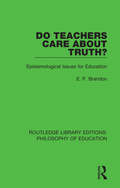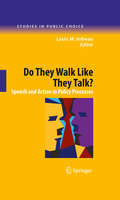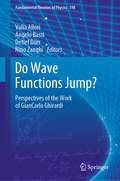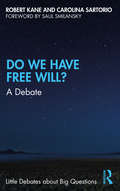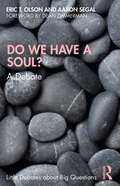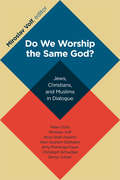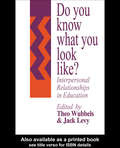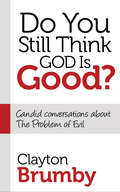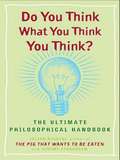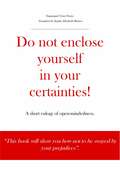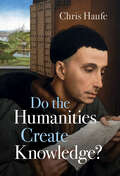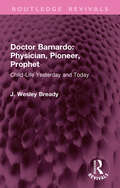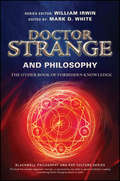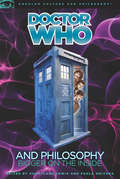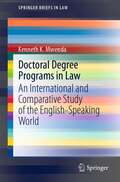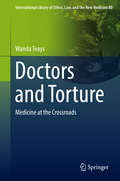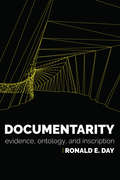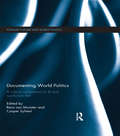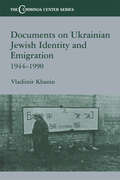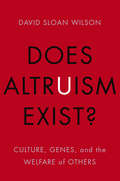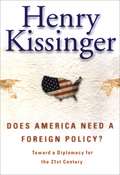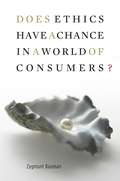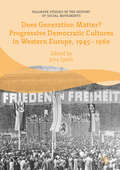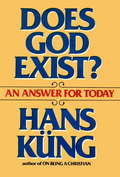- Table View
- List View
Do Teachers Care About Truth?: Epistemological Issues for Education (Routledge Library Editions: Philosophy of Education #2)
by E. P. BrandonThis book, first published in 1987, examines the notion of truth and then discusses knowledge and the way in which much of our knowledge revises or rejects the common-sense we start from. The author argues that our knowledge is not as secure as some would like to think and that there are important limits to the possibility for explanation. He shows how values permeate our ordinary thinking and argues against the objectivity of these values, showing the practical consequences of this argument for teaching in schools. This stimulating approach to a fundamental educational issue does not require previous experience of formal philosophy and will be useful to both education students and teachers in schools.
Do They Walk Like They Talk?
by Louis M. ImbeauGeorge Bush's 1988 campaign pledge, "Read my lips: no new taxes," has become a mantra for those who distrust politicians and bureaucrats. The gulf between what political leaders say and do seems to be widening, and in democratic societies around the world, contributing to an atmosphere of cynicism and apathy among the citizenry. Understanding the characteristics and functions of speech in policy processes is a requirement for trying to overcome this problem; indeed, politicians and bureaucrats spend a good proportion of their time and resources discoursing, i.e., writing, speaking, and publishing. However, there has been scant analysis of political discourse; the aim of this book is to fill this analytical gap, by exploring political speech from a variety of perspectives, including normative, epistemological, and empirical. Incorporating insights from economics, political science, philosophy, and law, and evidence from the United States, Canada, France, Italy, Turkey, and the EU, the book addresses a wide variety of timely issues, including:. Fiscal discipline in speeches vs budget balance: Is an improvement (deterioration) of the budget balance preceded by a more (less) fiscally disciplined discourse? Revenues and spending forecasted in budget speeches vs realised budget outcomes: Is there a systematic bias? If so, how can we explain it? Electoral pledges vs actual realisations: Do governments follow up on their electoral pledges? Ideological stance in party publications vs spending and revenues of party governments: Do parties of the right and the left speak different languages? How can we validly classify a government as of the left or of the right? Is there a systematic difference between governments of the right and of the left in terms of their policy? Speeches by central bank officers vs monetary policy: Can changes in monetary policy be predicted by official speeches? The political business cycle: How can taking into consideration the speech-action relationship strengthen (or threaten) our knowledge about electoral and partisan cycles in public spending? Other questions explored include: Should policy makers always tell the truth and all the truth? What are the benefits and the costs of transparency? How can we resolve the apparent contradiction between the democratic demand for transparency and the efficiency requirement of secrecy in many policy areas (budget preparation, monetary policy, foreign policy, security, etc.)? Under which conditions is secrecy acceptable in a democratic society? To what extent may deception and lies lead to a breach of trust or to power abuse? What are the most efficient institutional mechanisms to prevent such abuse? Collectively, the authors present new insights for understanding political process and government activity, and suggest avenues for further research.
Do Wave Functions Jump?: Perspectives of the Work of GianCarlo Ghirardi (Fundamental Theories of Physics #198)
by Detlef Dürr Angelo Bassi Valia Allori Nino ZanghiThis book is a tribute to the scientific legacy of GianCarlo Ghirardi, who was one of the most influential scientists in the field of modern foundations of quantum theory. In this appraisal, contributions from friends, collaborators and colleagues reflect the influence of his world of thoughts on theory, experiments and philosophy, while also offering prospects for future research in the foundations of quantum physics. The themes of the contributions revolve around the physical reality of the wave function and its notorious collapse, randomness, relativity and experiments.
Do We Have Free Will?: A Debate (Little Debates about Big Questions)
by Robert H Kane Carolina SartorioIn this little but profound volume, Robert Kane and Carolina Sartorio debate a perennial question: Do We Have Free Will? Kane introduces and defends libertarianism about free will: free will is incompatible with determinism; we are free; we are not determined. Sartorio introduces and defends compatibilism about free will: free will is compatible with determinism; we can be free even while our actions are determined through and through. Simplifying tricky terminology and complicated concepts for readers new to the debate, the authors also cover the latest developments on a controversial topic that gets us entangled in questions about blameworthiness and responsibility, coercion and control, and much more. Each author first presents their own side, and then they interact through two rounds of objections and replies. Pedagogical features include standard form arguments, section summaries, bolded key terms and principles, a glossary, and annotated reading lists. Short, lively and accessible, the debate showcases diverse and cutting-edge work on free will. As per Saul Smilansky’s foreword, Kane and Sartorio, "present the readers with two things at once: an introduction to the traditional free will problem; and a demonstration of what a great yet very much alive and relevant philosophical problem is like." Key Features: Covers major concepts, views and arguments about free will in an engaging format Accessible style and pedagogical features for students and general readers Cutting-edge contributions by preeminent scholars on free will.
Do We Have a Soul?: A Debate (Little Debates about Big Questions)
by Aaron Segal Eric T. OlsonAre we made entirely of matter, like sticks and stones? Or do we have a soul—a nonphysical entity—where our mental lives take place? The authors Eric T. Olson and Aaron Segal begin this accessible and wide-ranging debate by looking at the often-overlooked question of whether we appear in ordinary experience to be material things. Olson then argues that the dependence of our mental lives on the condition of our brains—the fact that general anesthesia causes complete unconsciousness, for instance—is best explained by saying that our mental lives are physical activities in our brains rather than nonphysical activities in the soul. Segal objects that this view is incompatible with two obvious and important facts about ourselves: that there is only one of you rather than trillions of almost identical beings now thinking your thoughts, and that we exist and remain conscious for more than an instant. These facts, he claims, are presupposed in our practical and moral judgments—but they require us to be immaterial things. Olson is forced to concede that there is no easy and uncontroversial answer to these objections but doubts whether taking us to be immaterial would be any help. The debate takes in large philosophical questions extending well beyond dualism and materialism. The book features clear statements of each argument, responses to counter-arguments, in-text definitions, a glossary of key terms, and section summaries. Scholars and students alike will find it easy to follow the debate and learn the key concepts from metaphysics, philosophy of mind, and other areas necessary to understand each position. Key Features Is the only introductory book devoted to the debate between substance dualism and materialism Discusses both traditional and novel arguments for each position Debates important but infrequently discussed questions, including: do we appear, in ordinary experience, to be material? should materialism be the default view? is there a good probabilistic argument for materialism? Written in a lively and accessible style Uses only a limited number of technical terms and defines all of them in the glossary
Do We Worship the Same God?: Jews, Christians, and Muslims in Dialogue
by Miroslav VolfOften the differences between the three Abrahamic religions -- Judaism, Christianity, and Islam -- seem more obvious than their commonalities, leading to the question "Do we worship the same God?" Can the answer be "yes" without denying our differences? This volume brings Jewish, Christian, and Muslim philosophers and theologians together to answer this question, offering rare insight into how representatives of each religion view the other monotheistic faiths. Each of their contributions uniquely approaches the primary question from a philosophical perspective that is informed by the practice of worship and prayer. Concepts covered include "sameness" and "oneness," the nature of God, epistemology, and the Trinity. Do We Worship the Same God? models serious-minded, honest, and respectful interreligious dialogue and gives us new ways to address an ongoing question.
Do You Know What You Look Like?: Interpersonal Relationships In Education
by Jack LevyMuch of the work in this book has originated from an international project called "Education for Teachers". Educational researchers from Holland, USA, Australia and Israel look at an important element of teacher behaviour - that is the interpersonal actions which create and maintain a positive classroom atmosphere. The book uses systems theory and family therapy to analyze what happens in classrooms, looking at classes as "big families". It provides a simple way to collect feedback from participants in communication in education (students, teachers, principles, student-teacher supervisors). Thus for example, differences between students' perceptions and the teachers self-perception of the teacher communication style are are formed. This feedback can be used to improve teaching. The book reviews research on communication styles of teachers in secondary education with the help of the questionnaire on teacher interaction and includes implications for teacher programs.
Do You Still Think God Is Good?: Candid Conversations about the Problem of Evil
by Clayton BrumbyHow does God's existence make sense in light of the evil and suffering we see all around us? This is a conversation between two and then three evangelical Christian college students, an atheist, a Jew, and a Christian youth minister.
Do You Think What You Think You Think?
by Julian Baggini Jeremy StangroomExplore the gray areas in your gray matter with philosophical brainteasers from the bestselling author of The Pig That Wants to Be Eaten <P> Is your brain ready for a thorough philosophical health check? <P> The author of the international bestseller The Pig That Wants to Be Eaten and his fellow founding editor of The Philosopher's Magazine have some thought-provoking questions about your thinking: Is what you believe coherent and consistent? or a jumble of contradictions? If you could design a God, what would He, She, or It be like? And how will you fare on the tricky terrain of ethics when your taboos are under the spotlight? Here are a dozen philosophical quizzes guaranteed to make armchair philosophers uncomfortably shift in their seats. The answers will reveal what you really think-and it may not be what you thought. Fun, challenging, and surprising, this book will enable you to discover the you you never knew you were.<P> Advisory: Bookshare has learned that this book offers only partial accessibility. We have kept it in the collection because it is useful for some of our members. To explore further access options with us, please contact us through the Book Quality link on the right sidebar. Benetech is actively working on projects to improve accessibility issues such as these.
Do not enclose yourself in your certainties! A short eulogy of open-mindedness.
by Sophie Murten Emmanuel Terre-NeuveBeing open-minded is not so easy when we live in a society full of divides, damaged by tensions, prejudices and incomprehension. We find many difficulties in making our diversity a richness. The objective of this small book is not to give lessons of philosophy or morale, but to enumerate a few tools that will enable us to be less complaisant in our certainties. Open-mindedness is not decreed, it is worked on. Let’s pull up our sleeves!
Do the Humanities Create Knowledge?
by Chris HaufeThere is in certain circles a widely held belief that the only proper kind of knowledge is scientific knowledge. This belief often runs parallel to the notion that legitimate knowledge is obtained when a scientist follows a rigorous investigative procedure called the 'scientific method'. Chris Haufe challenges this idea. He shows that what we know about the so-called scientific method rests fundamentally on the use of finely tuned human judgments directed toward certain questions about the natural world. He suggests that this dependence on judgment in fact reveals deep affinities between scientific knowledge and another, equally important, sort of comprehension: that of humanistic creative endeavour. His wide-ranging and stimulating new book uncovers the unexpected unity underlying all our efforts – whether scientific or arts-based – to understand human experience. In so doing, it makes a vital contribution to broader conversation about the value of the humanities in an increasingly STEM-saturated educational culture.
Doctor Barnardo: Child-Life Yesterday and Today (Routledge Revivals)
by J. Wesley BreadyOriginally published in 1930, the main focus of this book is the study of the man and the homes for children which he founded but against a backdrop of the unparalleled era of social reform, in which children were finally recognized as social assets of incalculable worth. Barnardo’s work is therefore not treated as an isolated phenomenon. It is analysed for its profound significance as a pioneer movement in child-welfare and its legacy is visible as much in the 21st century as in the 19th. Where Wilberforce liberated enslaved people, and Shaftesbury the industrial worker, so Barnardo immeasurably helped thousands of homeless children.
Doctor Strange and Philosophy: The Other Book of Forbidden Knowledge (The Blackwell Philosophy and Pop Culture Series)
by William IrwinExplore the mind and world of the brilliant neurosurgeon-turned-Sorcerer Supreme Doctor Stephen Strange Marvel Comics legends Stan Lee and Steve Ditko first introduced Doctor Stephen Strange to the world in 1963—and his spellbinding adventures have wowed comic book fans ever since. Over fifty years later, the brilliant neurosurgeon-turned-Sorcerer Supreme has finally travelled from the pages of comics to the big screen, introducing a new generation of fans to his mind-bending mysticism and self-sacrificing heroics. In Doctor Strange and Philosophy, Mark D. White takes readers on a tour through some of the most interesting and unusual philosophical questions which surround Stephen Strange and his place in the Marvel Universe. Essays from two-dozen Philosophers Supreme illuminate how essential philosophical concepts, including existentialism, epistemology, metaphysics, and ethics, relate to the world of Doctor Strange. Fans will find answers to all their Strange questions: How does Doctor Strange reconcile his beliefs in science and magic? What does his astral self say about the relationship between mind and body? Why is he always so alone? And what does he mean when he says we’re just “tiny momentary specks within an indifferent universe”—and why was he wrong? You won’t need the Eye of Agamotto to comprehend all that is wise within. Doctor Strange and Philosophy offers comic book fans and philosophers alike the chance to dive deeper into the world of one of Marvel’s most mystical superheroes.
Doctor Who and Philosophy
by Courtland Lewis Paula SmithkaNot only is Doctor Who the longest-running science fiction TV show in history, but it has also been translated into numerous languages, broadcast around the world, and referred to as the "way of the future" by some British politicians. The Classic Doctor Who series built up a loyal American cult following, with regular conventions and other activities. The new series, relaunched in 2005, has emerged from culthood into mass awareness, with a steadily growing viewership and major sales of DVDs. The current series, featuring the Eleventh Doctor, Matt Smith, is breaking all earlier records, in both the UK and the US. Doctor Who is a continuing story about the adventures of a mysterious alien known as "the Doctor," a traveller of both time and space whose spacecraft is the TARDIS (Time and Relative Dimensions in Space), which from the outside looks like a British police telephone box of the 1950s. The TARDIS is "bigger on the inside than on the outside"-actually the interior is immense. The Doctor looks human, but has two hearts, and a knowledge of all languages in the universe. Periodically, when the show changes the leading actor, the Doctor "regenerates."
Doctoral Degree Programs in Law: An International and Comparative Study of the English-Speaking World (SpringerBriefs in Law)
by Kenneth K. MwendaThis book offers a critical and insightful study of various doctoral programs in law, focusing on the English-speaking world. That the structures of doctoral degree programs in law differ between the United States and much of the Commonwealth are an issue that requires no debate. What is missing in the discourse, however, is a narrative on how these programs are structured and how they compare. This book attempts to fill that gap. A key objective of the study is to provide an international and comparative analysis of the efficacy of the American- and British-styled models of law doctorates. In so doing, it provides a conceptual and theoretical framework for the development of effective doctoral programs in law, contending that the defining characteristic of a doctorate is that it recognizes an independent contribution to the subject rather than the completion of taught coursework, however, advanced. The book goes on to examine the concept of a higher doctorate in law as a possible means of strengthening the concept of a law doctorate in legal academia.This book was written against the backdrop of the recently adopted Global Convention on the Recognition of Qualifications concerning higher education. It was adopted by the UNESCO General Conference in Paris on November 25, 2019, making it the first United Nations treaty on higher education with a global scope. The target audience of the book includes scholars in higher education; scholars in legal education; law school deans and administrators; law professors and students; Ministries of Higher Education in countries around the globe; accrediting agencies for doctoral studies; bar admission and legal education societies; and UNESCO and other international organizations.
Doctors and Torture: Medicine at the Crossroads (International Library of Ethics, Law, and the New Medicine #80)
by Wanda TeaysThis book brings into sharp relief the extent to which the medical profession has enabled or participated in actions that are at moral crossroads. Physical and psychological abuse and violations of medical codes have already been brought to light by concerned bioethicists responding to ethical lapses of the “war on terror.” This book goes to the next level by looking at three areas that also merit our attention and call us to speak out against abuses. These are (1) dehumanization (such as forced nudity, hooding, sensory deprivation, exploitation of phobias, waterboarding, and environmental manipulation), (2) non-consensual forced-feeding, and (3) solitary confinement. Each area raises important questions for the medical profession.Author Wanda Teays calls upon doctors and nurses to reflect on the role they play in the unethical treatment of prisoners and detainees by crossing moral boundaries around each of these areas. In the process, we are reminded that bioethics is global, not local — and the concerns of the discipline encompass issues with a wider scope.
Documentarity: Evidence, Ontology, and Inscription (History and Foundations of Information Science)
by Ronald E. DayA historical-conceptual account of the different genres, technologies, modes of inscription, and innate powers of expression by which something becomes evident.In this book, Ronald Day offers a historical-conceptual account of how something becomes evident. Crossing philosophical ontology with documentary ontology, Day investigates the different genres, technologies, modes of inscription, and innate powers of expression by which something comes into presence and makes itself evident. He calls this philosophy of evidence documentarity, and it is through this theoretical lens that he examines documentary evidence (and documentation) within the tradition of Western philosophy, largely understood as representational in its epistemology, ontology, aesthetics, and politics.Day discusses the expression of beings or entities as evidence of what exists through a range of categories and modes, from Plato's notion that ideas are universal types expressed in evidential particulars to the representation of powerful particulars in social media and machine learning algorithms. He considers, among other topics, the contrast between positivist and anthropological documentation traditions; the ontological and epistemological importance of the documentary index; the nineteenth-century French novel's documentary realism and the avant-garde's critique of representation; performative literary genres; expression as a form of self evidence; and the “post-documentation” technologies of social media and machine learning, described as a posteriori, real-time technologies of documentation. Ultimately, the representational means are not only information and knowledge technologies but technologies of judgment, judging entities both descriptively and prescriptively.
Documenting World Politics: A Critical Companion to IR and Non-Fiction Film (Popular Culture and World Politics)
by Casper Sylvest Rens Van MunsterAs a central component of contemporary culture, films mirror and shape political debate. Reflecting on this development, scholars in the field of International Relations (IR) increasingly explore the intersection of TV series, fiction film and global politics. So far, however, virtually no systematic scholarly attention has been given to documentary film within IR. This book fills this void by offering a critical companion to the subject aimed at assisting students, teachers and scholars of IR in understanding and assessing the various ways in which documentary films matter in global politics. The authors of this volume argue that much can be gained if we do not just think of documentaries as a window on or intervention in reality, but as a political epistemology that – like theories – involve particular postures, strategies and methodologies towards the world to which they provide access. This work will be of great interest to students and scholars of international relations, popular culture and world politics and media studies alike.
Documents on Ukrainian-Jewish Identity and Emigration, 1944-1990
by Vladimir KhaninThis volume provides a unique perspective on the social, cultural and political situation of the Jewish population in postwar Soviet Ukraine. It is based on declassified collections of documents from the Ukrainian central and regional archives.
Does Altruism Exist?
by David Sloan WilsonDavid Sloan Wilson, one of the world’s leading evolutionists, addresses a question that has puzzled philosophers, psychologists, and evolutionary biologists for centuries: Does altruism exist naturally among the Earth’s creatures? The key to understanding the existence of altruism, Wilson argues, is by understanding the role it plays in the social organization of groups. Groups that function like organisms indubitably exist, and organisms evolved from groups. Evolutionists largely agree on how functionally organized groups evolve, ending decades of controversy, but the resolution casts altruism in a new light: altruism exists but shouldn’t necessarily occupy center stage in our understanding of social behavior. After laying a general theoretical foundation, Wilson surveys altruism and group-level functional organization in our own species—in religion, in economics, and in the rest of everyday life. He shows that altruism is not categorically good and can have pathological consequences. Finally, he shows how a social theory that goes beyond altruism by focusing on group function can help to improve the human condition in a practical sense. Does Altruism Exist? puts old controversies to rest and will become the center of debate for decades to come.
Does America Need a Foreign Policy? Toward a New Diplomacy for the 21st Century
by Henry KissingerIn this timely, thoughtful, and important book, at once far-seeing and brilliantly readable, America's most famous diplomatist explains why we urgently need a new and coherent foreign policy and what our foreign policy goals should be in the post-Cold War world of globalization. Dr. Henry Kissinger covers the wide range of problems facing the United States at the beginning of a new millennium and a new presidency, with particular attention to such hot spots as Vladimir Putin's Russia, the new China, the globalized economy, and the demand for humanitarian intervention. He challenges Americans to understand that our foreign policy must be built upon America's permanent national interests, defining what these are, or should be, in the year 2001 and for the foreseeable future. Here Dr. Kissinger shares with readers his insights into the foreign policy problems and opportunities that confront the United States today, including the challenge to conventional diplomacy posed by globalization, rapid capital movement, and instant communication; the challenge of modernizing China; the impact of Russia's precipitous decline from superpower status; the growing estrangement between the United States and Europe; the questions that arise from making "humanitarian intervention" a part of "the New Diplomacy"; and the prospect that America's transformation into the one remaining superpower and global leader may unite other countries against presumed imperial ambitions. Viewing America's international position through the immediate lens of policy choices rather than from the distant hindsight of historical analysis, Dr. Kissinger takes an approach to the country's current role as the world's dominant power that offers both an invaluable perspective on the state of the Union in global affairs and a careful, detailed prescription on exactly how we must proceed. In seven accessible chapters, Does America Need a Foreign Policy? provides a crystalline assessment of how the United States' ascendancy as the world's dominant presence in the twentieth century may be effectively reconciled with the urgent need in the twenty-first century to achieve a bold new world order. By examining America's present and future relations with Russia, China, Europe, the Middle East, Africa, Latin America, and Asia, in conjunction with emerging concerns such as globalization, nuclear weapons proliferation, free trade, and the planet's eroding natural environment, Dr. Kissinger lays out a compelling and comprehensively drawn vision for American policy in approaching decades.
Does America Need a Foreign Policy?: Toward a New Diplomacy for the 21st Century
by Henry KissingerIn this timely, thoughtful, and important book, at once far-seeing and brilliantly readable, America's most famous diplomatist explains why we urgently need a new and coherent foreign policy and what our foreign policy goals should be in the post-Cold War world of globalization. Dr. Henry Kissinger covers the wide range of problems facing the United States at the beginning of a new millennium and a new presidency, with particular attention to such hot spots as Vladimir Putin's Russia, the new China, the globalized economy, and the demand for humanitarian intervention. He challenges Americans to understand that our foreign policy must be built upon America's permanent national interests, defining what these are, or should be, in the year 2001 and for the foreseeable future. Here Dr. Kissinger shares with readers his insights into the foreign policy problems and opportunities that confront the United States today, including the challenge to conventional diplomacy posed by globalization, rapid capital movement, and instant communication; the challenge of modernizing China; the impact of Russia's precipitous decline from superpower status; the growing estrangement between the United States and Europe; the questions that arise from making "humanitarian intervention" a part of "the New Diplomacy"; and the prospect that America's transformation into the one remaining superpower and global leader may unite other countries against presumed imperial ambitions. Viewing America's international position through the immediate lens of policy choices rather than from the distant hindsight of historical analysis, Dr. Kissinger takes an approach to the country's current role as the world's dominant power that offers both an invaluable perspective on the state of the Union in global affairs and a careful, detailed prescription on exactly how we must proceed. In seven accessible chapters, Does America Need a Foreign Policy? provides a crystalline assessment of how the United States' ascendancy as the world's dominant presence in the twentieth century may be effectively reconciled with the urgent need in the twenty-first century to achieve a bold new world order. By examining America's present and future relations with Russia, China, Europe, the Middle East, Africa, Latin America, and Asia, in conjunction with emerging concerns such as globalization, nuclear weapons proliferation, free trade, and the planet's eroding natural environment, Dr. Kissinger lays out a compelling and comprehensively drawn vision for American policy in approaching decades.
Does Ethics Have a Chance in a World of Consumers? (Institute for Human Sciences Vienna Lecture Series)
by Zygmunt BaumanZygmunt Bauman is one of the most admired social thinkers of our time. Once a Marxist sociologist, he has surrendered the narrowness of both Marxism and sociology, and dares to write in language that ordinary people can understand—about problems they feel ill equipped to solve. This book is no dry treatise but is instead what Bauman calls “a report from a battlefield,” part of the struggle to find new and adequate ways of thinking about the world in which we live. Rather than searching for solutions to what are perhaps the insoluble problems of the modern world, Bauman proposes that we reframe the way we think about these problems. In an era of routine travel, where most people circulate widely, the inherited beliefs that aid our thinking about the world have become an obstacle. Bauman seeks to liberate us from the thinking that renders us hopeless in the face of our own domineering governments and threats from unknown forces abroad. He shows us we can give up belief in a hierarchical arrangement of states and powers. He challenges members of the “knowledge class” to overcome their estrangement from the rest of society. Gracefully, provocatively, Bauman urges us to think in new ways about a newly flexible, newly challenging modern world. As Bauman notes, quoting Vaclav Havel, “hope is not a prognostication.” It is, rather, alongside courage and will, a mundane, common weapon that is too seldom used.
Does Generation Matter? Progressive Democratic Cultures in Western Europe, 1945–1960 (Palgrave Studies in the History of Social Movements)
by Jens Späth“Generation” has become a central concept of cultural, historical and social studies. This book analyses how this concept is currently used and how it relates to memory and constructions of historical meaning from educational, historical, legal and political perspectives. Attempts to compare different national generations or to elaborate boundary-crossing, transnational generations still constitute an exception. In trying to fill this gap, this collection of essays concentrates on one crucial moment of “the age of extremes” and on one specific generation: the year 1945 and its progressive politicians and intellectuals. Focusing on Italy, West Germany and France, it suggests that the concept of generation should be regarded as an open question in space and time. Therefore, this volume asks what role generation played in the intellectual and political debates of 1945: if it facilitated change, if it served as source of solidarity and cohesion and how post-war societies organized their time.
